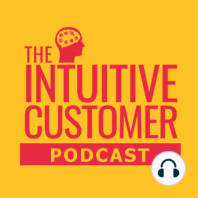26 min listen

The Tools To Use To Create Actionable Measures
FromThe Intuitive Customer - Helping You Improve Your Customer Experience To Gain Growth
The Tools To Use To Create Actionable Measures
FromThe Intuitive Customer - Helping You Improve Your Customer Experience To Gain Growth
ratings:
Length:
38 minutes
Released:
Mar 2, 2019
Format:
Podcast episode
Description
A significant influence on your Customer Experience outcome is how customers feel during your experience. In our global Customer Experience consultancy, we say that emotions are over 50 percent of a Customer Experience. For good or ill, customer feelings have a profound effect on how they remember your experience also. Despite my belief and routine pronouncement of these facts, I am astonished by how many companies don't bother with measuring customer emotions. Those that do measure customer emotions don’t think about how they will use it. Measuring customer emotions in real time is paramount for your Customer Experience strategy. You need to know when your experience is producing appropriate feelings and, perhaps more importantly, when it is not. “If you can’t measure it, you can’t manage it” applies to this situation. To measure customer emotions, you need the proper tools to do a job. This episode of The Intuitive Customer talks about the tools you use to measure customer emotions in real time. However, here is some free advice: Before investing any time or money in customer emotion research, be sure you have a plan in place to use it. At British Telecom (BT), I learned the significance of having a plan for the research you receive. I was sitting in a presentation about BT’s customer satisfaction that year regarding our products and services. Our presenter had a “why bother?” attitude. It was apparent to everyone in the room. I couldn’t let it lie. I had to ask why she didn’t seem to care about what she was telling us. Surprisingly, she told me straight out. “This is the third year you've employed us to do this research,” she explained. “And every year we come back and tell you the same results. And every year you do nothing about it. Why do you bother?” This conversation predates my next reference, but I could swear I heard a distinct Mic Drop. She was right, of course. We hadn’t a bloody clue what to do with the information she was sharing. Or, perhaps more accurately, could not have cared less about what to do with the research. It was a cultural thing. Also, it was before Customer Experience was the popular concept bandied about in corporate speak today. Research is essential to take your Customer Experience to the next level. Knowing how your customer feels during your experience and how it influences customer behavior is vital to your customer-centric Customer Experience Strategy. As Customer Experience consultants, we think measuring customer emotions in real time is a crucial aspect of your customer success. Listen to the podcast in its entirety to learn more about How to Measure Authentic Customer Emotions in Real Time for your Customer Experience. The Intuitive Customer podcasts are designed to explain the psychological concepts behind customer behavior. If you would like to find out from one of our CX consultants how you can implement the concepts we discussed in your organization’s marketing to improve customer loyalty and retention, contact us at www.beyondphilosophy.com. To subscribe to The Intuitive Customer and never miss a podcast, please click here.
Released:
Mar 2, 2019
Format:
Podcast episode
Titles in the series (100)
How Do I Convince People Of A New Way Of Thinking?: Why didn't Blockbuster, Kodak and Circuit City see that the end was in sight? by The Intuitive Customer - Helping You Improve Your Customer Experience To Gain Growth